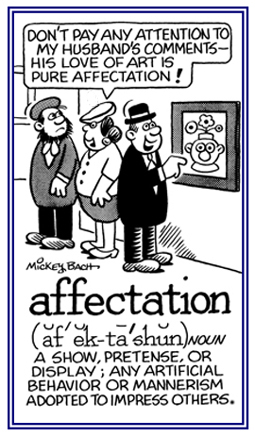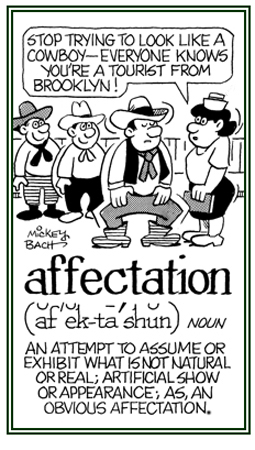-ation, -ization (-iz[e] + -ation); -isation (British spelling variation)
(Greek > Latin: a suffix; action, act, process, state, or condition; or result of doing something)
Although there are over 1,450 word entries ending with -ation or -ization listed in this unit, there are certainly many more which exist in the English language. At any rate, this unit provides a significant number of -ation and -ization examples for you to see.
The fact of being darkened or overshadowed: The adumbration of Ruth's marriage was caused when her sister stated that she was going to leave the country the following day.
1. The act of making a shadow or faint resemblance.
2. The shadowing or partial concealment of an area.
3. A faint sketch; an imperfect representation of a thing.
4. In heraldry, the shadow only of a figure, outlined, and painted of a color darker than the field.
2. The shadowing or partial concealment of an area.
3. A faint sketch; an imperfect representation of a thing.
4. In heraldry, the shadow only of a figure, outlined, and painted of a color darker than the field.
1. A transaction whereby someone pleads the cause of another person in a court of law: Jane’s advocation in support of her friend who was convicted of trespassing was respected by the judge and the whole jury.
2. What someone does for amusement, or for relaxation, away from his or her regular job; a hobby: A group of teachers whose avocations were the playing of musical instruments decided to form a small orchestra.
2. What someone does for amusement, or for relaxation, away from his or her regular job; a hobby: A group of teachers whose avocations were the playing of musical instruments decided to form a small orchestra.
Erosion of a land surface by wind-blown sand and dust: The aeolation on the sandstone surface made some gorgeous, artistic-like formations.
1. The process of exposing to air: Janet hung out her blouse for aeration in order to get rid of some of the cigarette smoke from the evening before.
2. The charging of a liquid with air or other gas: Aeration takes place by the oxygenation of blood in the bronchial alveoli.
3. The act of charging a liquid with a gas making it effervesce: Jack wanted to have his water bubbly, so he used the process of aeration to achieve this purpose.
2. The charging of a liquid with air or other gas: Aeration takes place by the oxygenation of blood in the bronchial alveoli.
3. The act of charging a liquid with a gas making it effervesce: Jack wanted to have his water bubbly, so he used the process of aeration to achieve this purpose.
Exposure to or filling with air; aeration: Jill's father showed her the method of aerification of the soil in their garden in order to have the best results with growing vegetables for their meals.
The electrical charging of particulate matter in the air: Aeroionization is said to be of therapeutic use by inhalation.
Dispersion in air of a liquid material or a solution in the form of a fine mist: The resulting product of aerosolization is usually used for therapeutic purposes, especially for the respiratory passages.
Aerosolization is the creation or generation of an aerosol.
1. An attempt to assume or to show what is not natural or real; a false display; an artificial show: Fay's affectations included wearing fancy clothing, driving an expensive car, and always ordering very expensive meals at restaurants.
2. An unusual mannerism or behavior that is not natural: Fred Black had a peculiar affectation of constantly putting his hat on and taking it off again which made some people think that he had an uncontrollable desire or compulsion to do this.
3. A particular habit; such as, speech or dress that is adopted to give an impression that is not real or true: Andre's high-toned English accent was an affectation which he assumed when auditioning for a part in a new theater production.

© ALL rights are reserved.

© ALL rights are reserved.
Go to this Word A Day Revisited Index
2. An unusual mannerism or behavior that is not natural: Fred Black had a peculiar affectation of constantly putting his hat on and taking it off again which made some people think that he had an uncontrollable desire or compulsion to do this.
3. A particular habit; such as, speech or dress that is adopted to give an impression that is not real or true: Andre's high-toned English accent was an affectation which he assumed when auditioning for a part in a new theater production.


Go to this Word A Day Revisited Index
so you can see more of Mickey Bach's cartoons.
A solemn and mutual promise of fidelity (loyalty to a person, a principle, or an organization): "Jeremy's affidation was that he would complete the project by a certain date."
An official relationship or association: "The two CEO’s signed the document, formalizing the affiliation of their two companies."
1. An assertion of support or agreement.
2. A positive statement, or the declaration, of the truth or existence of something.
3. A formal declaration acceptable in a court, usually made by someone who has a conscientious objection to taking an oath: The Constitution of the U.S. provides for an oath or an affirmation by officeholders.
4. A confirmation, or ratification, of the truth or validity of a prior judgment, decision, etc.
2. A positive statement, or the declaration, of the truth or existence of something.
3. A formal declaration acceptable in a court, usually made by someone who has a conscientious objection to taking an oath: The Constitution of the U.S. provides for an oath or an affirmation by officeholders.
4. A confirmation, or ratification, of the truth or validity of a prior judgment, decision, etc.
1. The addition of a prefix, a suffix, or an infix to a word in order to create a new expression or a variation in the meaning: The affixation of the term "establish" with "ment" at the end of the verb, creates the noun, "establishment", which then has a different understanding.
2. The formation of a word by means of an affix: The affixation of "discourage" uses the prefix "dis", which is added to the root "courage" and alters the content of the term.
2. The formation of a word by means of an affix: The affixation of "discourage" uses the prefix "dis", which is added to the root "courage" and alters the content of the term.
The effect of attaching an affixation to an expression transforms the content of the meaning or part of speech; for example, "recreation" (noun) can be changed to "recreational" (adjective).
In his English class at school, Jake learned how to convert the content of several words by using the method of affixation, which changes them from one part of speech to another one or changes their meanings completely.
afforest (verb), afforests; afforested; afforesting
To convert bare or uncultivated land into a forest, originally for the purpose of hunting: Currently ground can be afforested by planting trees, or their seeds, on a big scale for commercial use.
A subjective persistence of feeling something even after a stimulus has ceased to exist or is no longer there: During her physiotherapy appointments, Susan was given electric stimulation for her injured muscles and she said that she could usually feel the aftersensation of the electric stimulation which made her muscles feel relaxed.


